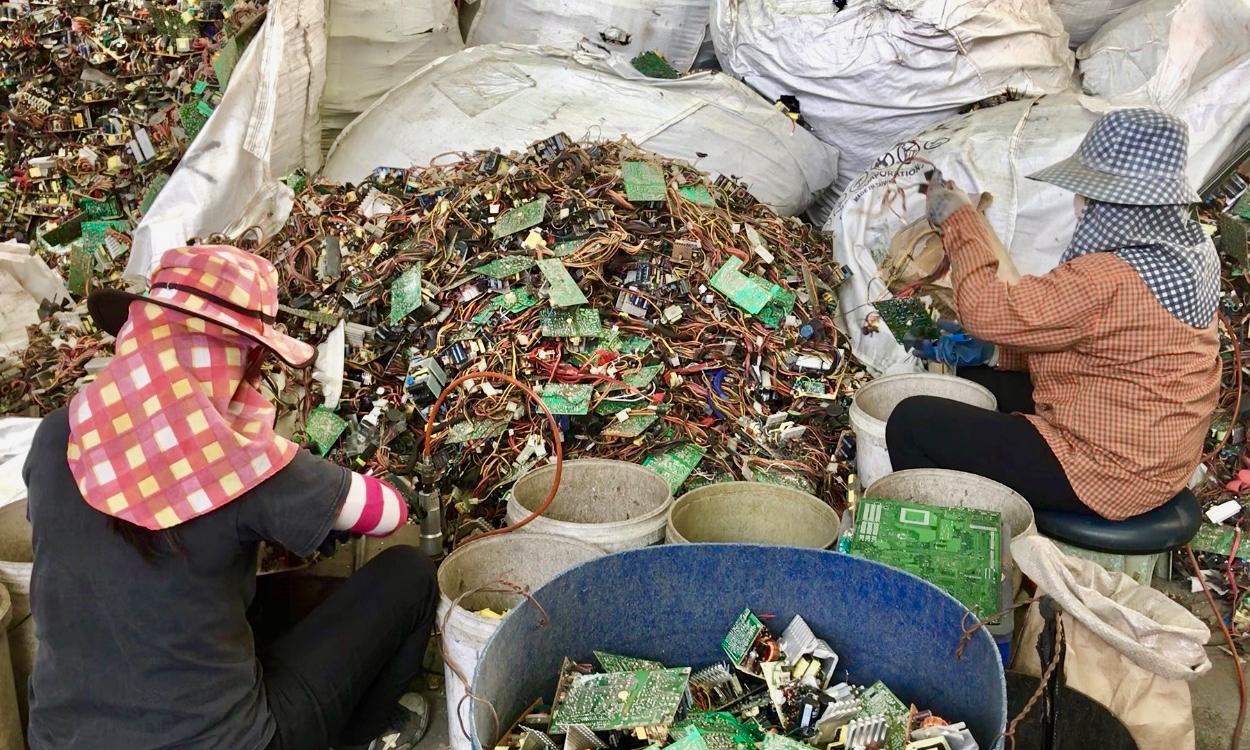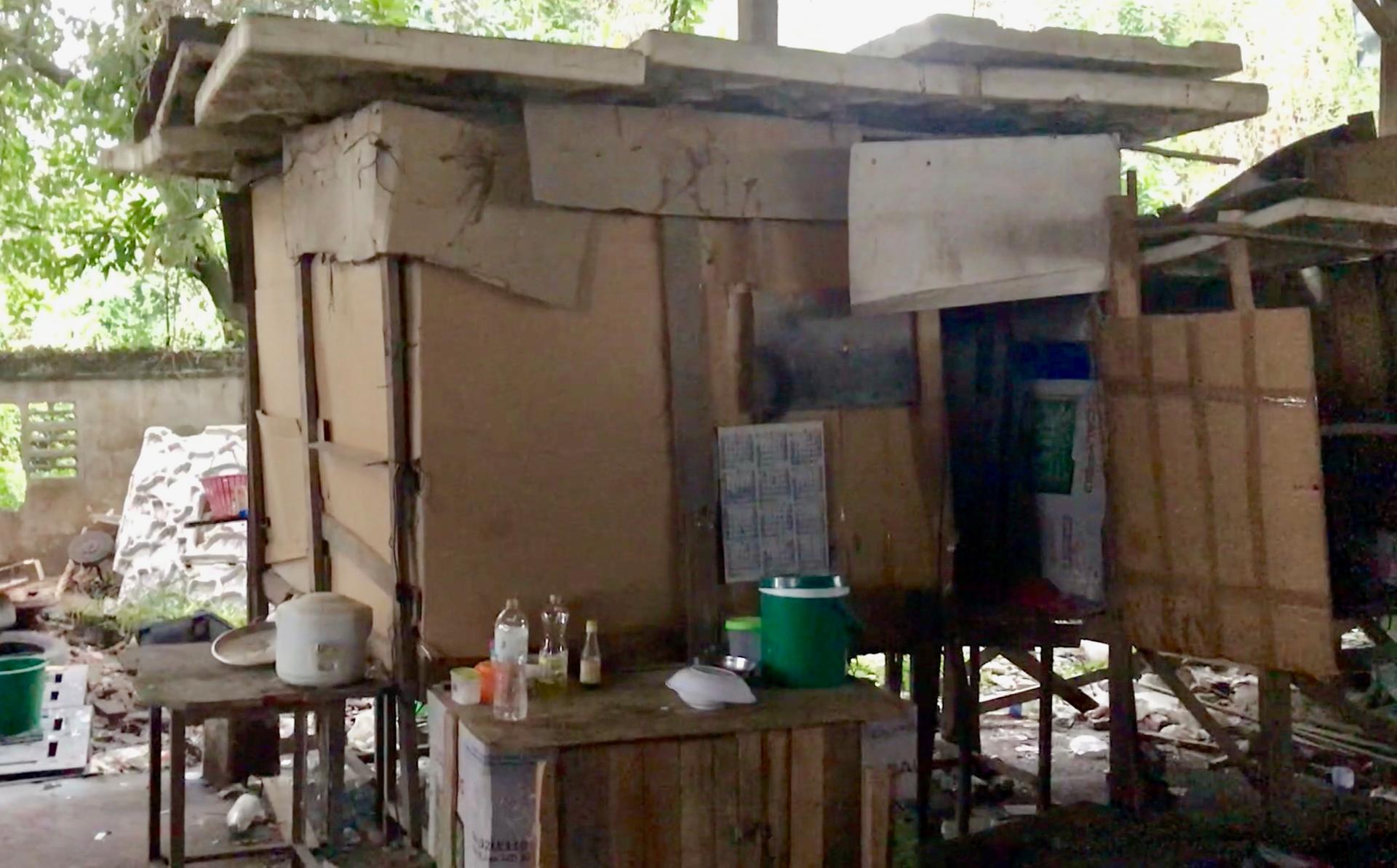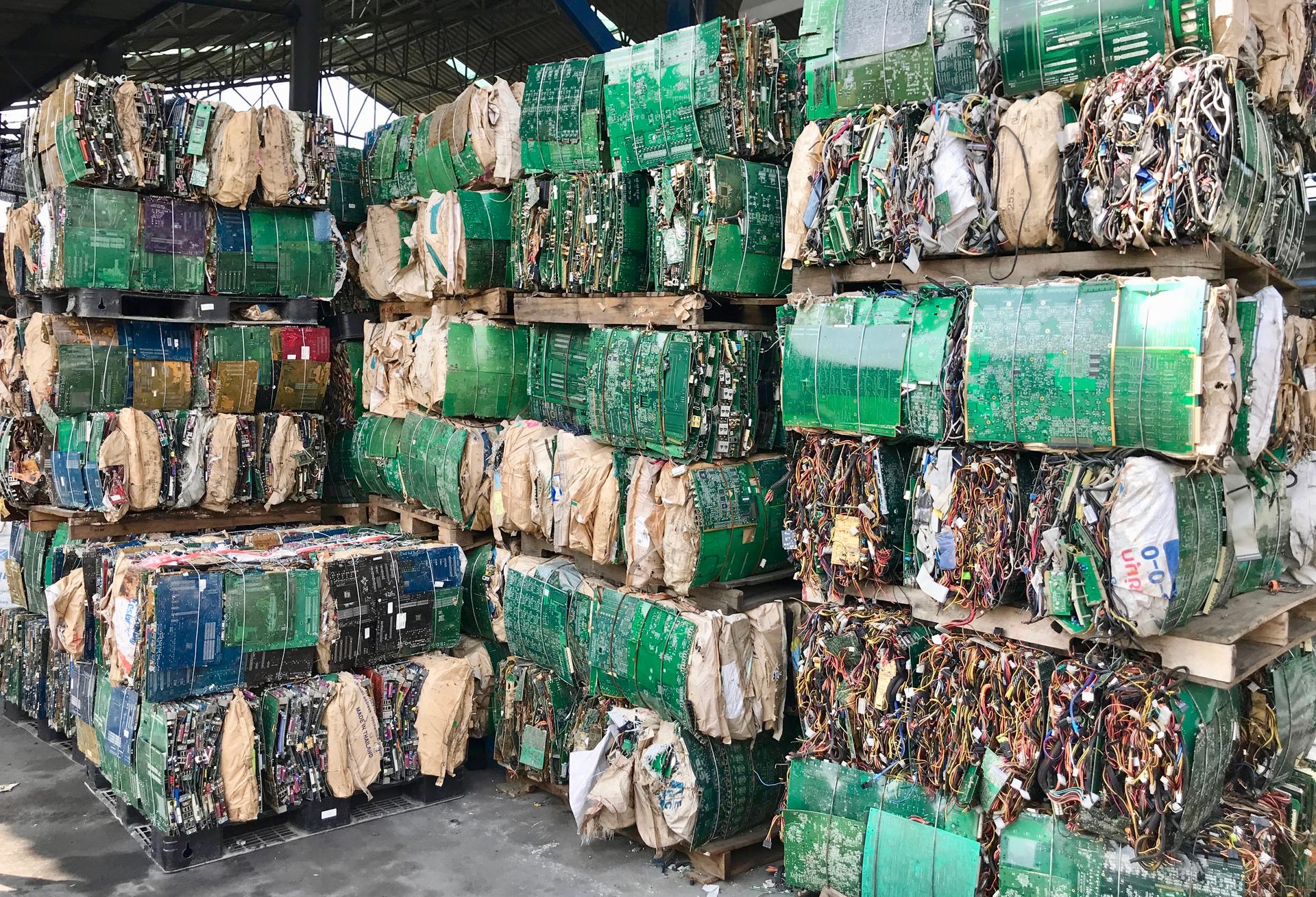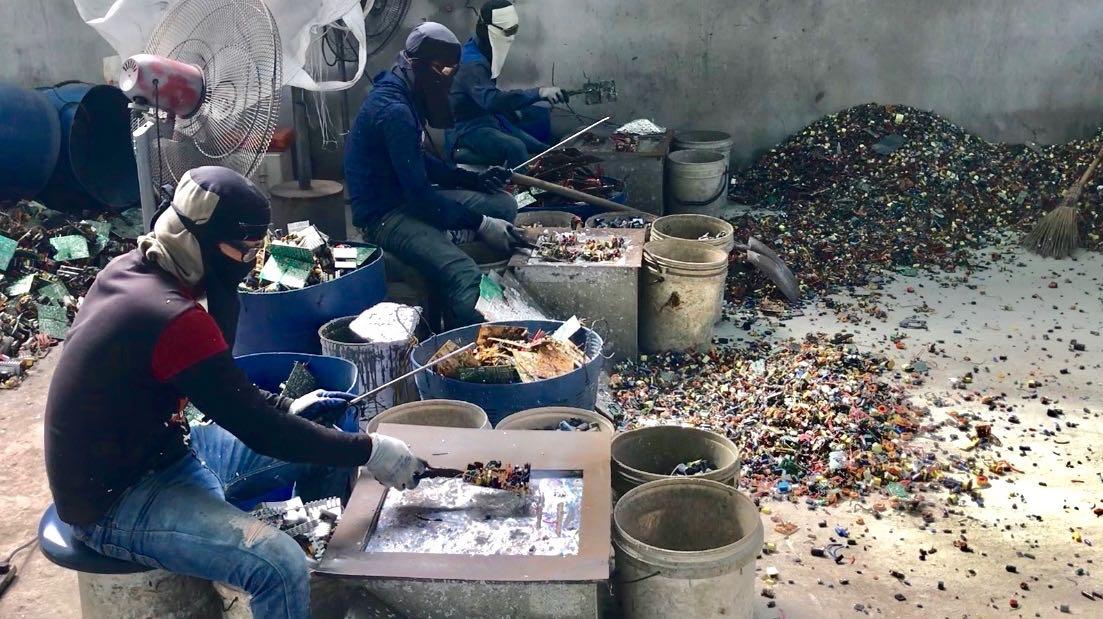Your ‘recycled’ laptop may be incinerated in an illegal Asian scrapyard
Workers smelt copper from electronic circuitry in a remote factory east of Bangkok, Thailand.
They call it “e-waste recycling.” But what happens inside Asia’s underground scrapyards looks more like crude alchemy.
Men and women, faces swaddled in cloth, hunch over steel furnaces. They melt down electronic guts ripped out of laptops and TVs. Under intense heat, gold and copper fused to circuit boards get soft and runny — and can be scraped into basins full of scalding, metallic sludge.
Once it cools, this sludge has value. There’s actually way more gold in 1 ton of computer scrap than in many tons of gold ore. But this process brings terrible costs, namely to human bodies.
As the workers scrape away, they are bathed in dioxin fumes that can cause lesions, brain disorders and cancer. Even those beyond the factory gates are vulnerable. The shredded remains of these electronic devices — chunks of plastic, glass and rubber — are chucked into an incinerator and ultimately disgorged through smokestacks.
Black ash is piped into the sky. This airborne filth can drift for miles and miles, stinging nostrils and killing plant life.
This is hardly what Americans envision when they drop off glitchy laptops or broken printers at their local recycling drop-off center. Yet, what fuels these Southeast Asian scrapyards is junk from afar — typically more affluent places such as Europe, Australia and the US.
“The junk comes in on shipping containers, trucked over from the port,” said Bee, a low-level administrator at an electronics scrapyard in Thailand (“Bee” is a pseudonym she provided in lieu of her actual name). Located halfway between Bangkok and the Cambodian border, it is a hulking factory surrounded by steel gates, but visible from afar by its rust-eaten smokestack.
“I don’t worry about where it comes from. We just open the door and let it in,” said Bee, a woman in her mid-30s wearing a T-shirt and a ponytail. “Once the work begins, you’ll need a mask.”

This smelting job is so undesirable that her bosses have to hire migrant workers from neighboring Myanmar. They hail from some of its most war-torn regions: Rakhine State along the Bay of Bengal, Shan State in mountains controlled by militias and rebels. “But at least they get paid 500 baht [$15] per day. And they get to sleep inside the factory for free.”
Related: Myanmar: Invest here, please. Don’t mind the insurgents.

“The locals, Thai people, will not do this job. They’re afraid of getting cancer.”
“The locals, Thai people, will not do this job,” Bee said. “They’re afraid of getting cancer.”
As they should be. One study published by the United Nations suggests that the job is sometimes fatal and that many “become sick and are forced to live with long-term illnesses.”
This is how shady “recyclers” cut costs to the bone. They recruit some of Asia’s most desperate workers. Then, they pay them a pittance to scour precious metals from high-tech gadgets, which are constantly being tossed out by the richest societies on Earth.
Related: A US-style drug war brings a terrible cost: Thai prisons packed full of women
Americans, for example, throw out an estimated 150 million mobile phones each year. As long as waste brokers can tap into that torrent of junk, and illegally divert it to faraway places with lax enforcement, they stand to get rich.
Very rich, in fact. Rank the most profitable organized crime rackets in Asia and e-waste smuggling comes out in the top five. It’s more lucrative than sex trafficking and wildlife smuggling combined. The most recent UN study, issued in 2009, pegs the trade at $3.75 billion per year.
That’s on par, according to some estimates, with what El Chapo’s cartel earned in its heyday — and those smugglers were trafficking bricks of cocaine, not your wonky Toshiba laptop with the broken screen.
Humans throw out roughly 50 million tons of e-waste per year. That’s enough to fill more than a million large shipping trucks lined up from New York to Bangkok. And back.
Scrape the gold, silver, copper and other metals from that haul and you’ll have the equivalent of $55 billion, more wealth than many nations generate in a year. But “mining” junk for gold is notoriously dangerous — and doing it the safe, humane way is prohibitively expensive.
So, towns across the US like to simply get rid of it, often by foisting their digital scrap into the hands of foreign brokers.
Roughly one-third of America’s recycled electronics gets exported. But drop-off centers in the US don’t always know exactly where their junk ends up. The best estimates indicate that more than 90% ultimately ends up somewhere in Asia.

Those stats come from the Basel Action Network or BAN, a Seattle-based nonprofit that, for years, has stuck GPS trackers in old electronic junk. They’ve found that, far too often, it ends up in grim settings — such as that aforementioned scrapyard in Thailand. (That particular location was discovered by planting a tracker in a TV and dropping it off at an Australian recycling center.)
Related: Fearful of losing power, Thailand’s army opts for democracy lite
This landscape used to be a little simpler. Until recently, the overwhelming majority of the world’s e-waste was shipped to a single country: China, where it was ripped apart by a vast industry of recyclers, some legit and others reckless.
“Once it got to China, it was just going into a black hole.”
“Once it got to China, it was just going into a black hole,” said Jim Puckett, director of BAN. But in 2013, President Xi Jinping’s government declared that China would no longer serve as the world’s dumping ground. Year after year, its police have tightened the screws, ferreting out dodgy recyclers who pollute the Chinese countryside.
“Xi has seemed to understand the ecological economics here,” Puckett said. Sure, recyclers could scrape gold out of foreign trash, “but they’re also contaminating the land, and there’s a price to that, too.” Such as poisoned rivers and pregnant women with lead in their blood.
When the Chinese government intensified its crackdown early last year, many e-waste brokers scattered into China’s backyard. These lawless recyclers quickly set up shop in Malaysia, Vietnam and Thailand, countries with good ports, cheap labor and lax enforcement.
Related: Mountains of US recycling pile up as China restricts imports
The transnational, e-waste trade is now in total disarray — and amid the chaos, brokers are fanning out across Asia, seeking new territory to exploit the weak and pollute the skies.
In Thailand, as in America, it is illegal to run a derelict scrapyard belching out cancerous smoke. Some bosses may get permits to run legitimate recycling (or repair) sites and simply flout the law. Others will go without papers, running underground operations. But either way, this is a form of organized crime, albeit a flavor yet to be dramatized by Hollywood.
When you imagine these criminals, don’t conjure up a guy with tattoos and a pistol on his hip, says Col. Tatsapum Jaruprat. He’s a deputy police commander with Thailand’s most elite environmental crimes unit.
“I’ve been investigating these guys, and they look just like normal businessmen. So, what makes them stand out? No matter which [illegal factory] we raid, we always find the owner is from China.”
“I’ve been investigating these guys, and they look just like normal businessmen,” he said. “So, what makes them stand out? No matter which [illegal factory] we raid, we always find the owner is from China.”
Indeed, at the dubious recycling factory visited by The World, Bee is employed by three “big bosses from China.” During our interview, one of these bosses spotted her talking to me on his surveillance cameras. He rushed across the factory grounds on a bicycle and whispered in her ear to “shut up.”
“These networks are all fairly new to Thailand,” Col. Tatsapum said. He concedes that the tidal wave of incoming e-waste has caught law enforcement off guard. “Our inspection, our law enforcement, has been somewhat lax. But now the big shots [senior officials] are really paying attention.”
Related: New Chinese policy is forcing people to think: Is there a better way to recycle?
“This isn’t your typical street crime,” he said. Unlike drug traffickers, e-waste criminals can’t smuggle in their wares along muddy jungle trails. They have to bring in shipping containers through busy ports (usually by mislabeling the contents) and then truck it to factories, which gush smoke that can be seen for miles around.
This begs the question: How could these lawbreakers get away with operating so brazenly without colluding with authorities — especially local police?
“We never tell the local cops what we’re doing or when we’re doing our busts. In fact, I won’t even tell officers [in a different unit] in the office next door. No one knows what we’re planning but us and our commander.”
Col. Tatsapum answers cryptically. He says that, within his elite unit, “we never tell the local cops what we’re doing or when we’re doing our busts. In fact, I won’t even tell officers [in a different unit] in the office next door. No one knows what we’re planning but us and our commander.”
The environmental crimes unit is wise to move in secrecy, says Penchom Saetang. Though soft-spoken, she is considered one of Thailand’s bolder environmental campaigners — and she has endured the threats that come with the job.
“The corruption in Thailand is very high, and it’s very serious. Not all of our officers are good people. Some are willing to get involved with the dark business of recycling.”
“The corruption in Thailand is very high, and it’s very serious,” Penchom said. “Not all of our officers are good people. Some are willing to get involved with the dark business of recycling.”
That culture of payoffs and protection, she says, is what attracted China’s e-waste criminals to Thailand in the first place. Moreover, Penchom believes many foreign brokers have linked up with provincial mafia groups in Thailand.
Related: As China gets tough on recycling, will America get cleaner?
The police colonel is right, she says, in noting that these Chinese businessmen don’t come off as pistol-toting thugs. But she says they may have local tough guys in their employ. Among their responsibilities: silencing anyone who dares to complain about their scrapyards.
“Breathing in the smoke from these factories will give you nausea and headaches,” Penchom said. But anyone who files a report or speaks to the media, she says, can risk retaliation.
Penchom cites a worrisome incident in the Thai province of Phetchaburi, where locals organizing against a scrapyard were visited at home by serious-looking guys, one of them with a gun on his hip. “The men told them, ‘Let us go about our business.’ It’s difficult to say if anyone could be killed,” she said. “But trying to protect your village is clearly risky.”
Raising the specter of violent reprisal is clearly effective. Riding around the vicinity of the above-mentioned Thai smelting yard — the one with the tall, ugly smokestack — I find plenty of farmers irate about the sickening fumes. It’s a flat and dusty place, given over the rice fields and chicken farms, and its proximity to Thailand’s busiest port makes it tempting for importers of computer scrap.
Attempts at formal interviews with locals, however, would cause them to recoil. One woman from a chicken-raising family, now tending to monks at a Buddhist temple, puts it this way: “We’re just villagers. Small people. We can’t raise our opinion about this. They’re rich, and we’re not. So it goes!” She says many locals are mindful of a mysterious 2012 killing in a neighboring province where a village headman was gunned down after rallying against toxic waste dumping.
There is some small hope, however, that Thailand’s officials may imitate China in stomping out illegal e-waste scrapyards before they spread even more disease and criminality.
Last year saw a wave of raids orchestrated by the environmental crimes unit, often with local TV channels tagging along. Cameras rolled as officers busted into huge compounds where circuit boards were piled high as houses.
The ensuing public fervor stoked talk of a total electronics scrap ban in Thailand. Since then, powerful business interests have pushed back, groaning that a ban would kill jobs and harm legit recyclers along with the lawbreakers.
But Penchom suggests another way to drain this “dark business” of its power: Twist the valve in wealthier nations, such as America, so that its discarded digital scrap doesn’t keep pouring into countries with weaker enforcement.
This is hardly a novel concept. There is a long-standing global agreement — the Basel Convention — that restricts the flow of toxic e-waste and encourages more affluent nations to process its scrap at home. More than 180 countries have ratified it, including every developed nation on Earth. Even Syria and North Korea are on board.
But not the United States.
“American people should address this issue. You have to fix your own problems. Don’t dump waste into Thailand — or any developing country.”
“American people should address this issue,” Penchom said. “You have to fix your own problems. Don’t dump waste into Thailand — or any developing country.”
Because even if Thailand follows China’s lead, she says, and refuses to take on this glut of digital junk from abroad, nefarious recyclers can always shift once again — perhaps to parts of South Asia or Africa where officials are open to bribes and locals are easily silenced.
Our coverage reaches millions each week, but only a small fraction of listeners contribute to sustain our program. We still need 224 more people to donate $100 or $10/monthly to unlock our $67,000 match. Will you help us get there today?
